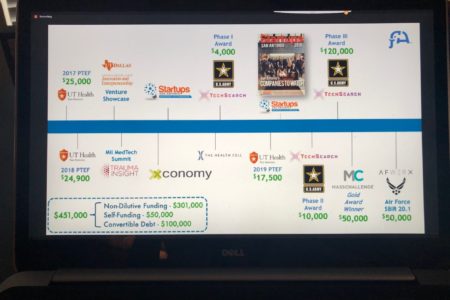Nine UT Health San Antonio clinicians and scientists pitched their innovations in the President’s Translational and Entrepreneurial Research Fund (PTEF) virtual forum held May 20. The health care innovations under consideration for the 2020 awards included, among others, a novel enhanced treatment strategy useful for non-healing fractures, a portable suction device for airway management in emergencies, a novel drug formulation to reduce the abuse liability of opioid medications, and the development of a new human antibody production platform.
PTEF, established at UT Health San Antonio five years ago, is made possible by endowment earnings from the Stella C. Herff Charitable Trust and other resources used at the discretion of the Office of the Vice President for Research and the Office of Technology Commercialization (OTC).
PTEF is intended to award early-stage seed funds to those projects that demonstrate a high probability of being commercialized but lack the resources to develop to the next pivotal stage. “PTEF is intended to help OTC, in concert with the awarded research team, move the promising idea to a development milestone that could result in either a larger life science partnership, a new company or both,” said John Gebhard, Ph.D., assistant vice president and executive director, innovation and industry ventures, for the Office of Technology Commercialization.
OTC organizes an annual PTEF Pitch Day that was delayed this year because of the COVID-19 pandemic. OTC then decided to offer it virtually and view the event as an opportunity to showcase UT Health San Antonio innovation to a broader audience. The more than 70 invited guests included industry leaders from not only Texas but from the life science hubs of the East Coast and West Coast, the Midwest and other states, as well as chief executive officers of life science companies in San Antonio. “Without you, we can’t push beyond our barriers,” Dr. Gebhard said to them.
Innovators push through, respond to COVID-19

The COVID-19 crisis hasn’t dampened the desire of faculty to innovate to meet needs in health care settings. “Many inventors are physicians who are still working on their projects even as they treat patients during COVID-19,” Dr. Gebhard said. “We saw an increase of 20% in inventions the last month and a half (April 1 to May 20). They are doing their jobs both day and night.”
Andrea Giuffrida, PhD, vice president for research, said the inventions funded by PTEF have the potential to make lives better and further enhance UT Health San Antonio’s stature as a premier research institution.
“Technology commercialization is a strategic priority for our organization,” Dr. Giuffrida said. “Last year we created a life sciences accelerator called TechNovum. Eight inventors went through a rigorous training, and it allowed the inventors to understand the complexity and what it takes to develop a biomedical product. Out of those eight TechNovum founders, we were able to create four startup companies. Many of the founders had been supported by PTEF.”
Support for aspiring life sciences entrepreneurs
“To date we have awarded close to $900,000 from PTEF, with one distribution per year,” Dr. Gebhard said.
Over the past decade, the Office of Technology Commercialization has guided faculty to 476 invention disclosures, 102 patents and 22 startup companies. Dr. Giuffrida commended the hard-working OTC staff.
Dr. Gebhard moderated questions and answers that followed each presentation. Questions were submitted in a chat room.
Company applications to PTEF are not allowed at this stage. All technologies presented are patent-protected and the information presented at PTEF is non-confidential, Dr. Gebhard said.
A PTEF success story
The virtual event concluded with a video about Olifant Medical, a life sciences company cofounded by UT Health San Antonio anesthesiologist Steven Venticinque, M.D. The company is advancing the TUSK Tracheal Cannulator, a device that improves operators’ capacity to insert a breathing tube, or cannula, to assist patients, particularly in emergency situations when establishing the patient’s airway is more difficult.
Olifant Medical recently developed a second product, a droplet and aerosol mitigating enclosure (the STAT Enclosure) that is being released in compliance with conditions set forth under an FDA Emergency Use Authorization (EUA) under Section 564(c) of the Food, Drug and Cosmetic Act. The STAT Enclosure is designed to protect health care providers during aerosolizing medical procedures.
Dr. Venticinque is the recipient of three PTEF awards that played a significant role in the company’s founding and the development of its products.
# # #
The University of Texas Health Science Center at San Antonio, also referred to as UT Health San Antonio, is one of the country’s leading health sciences universities and is designated as a Hispanic-Serving Institution by the U.S. Department of Education. With missions of teaching, research, patient care and community engagement, its schools of medicine, nursing, dentistry, health professions and graduate biomedical sciences have graduated more than 37,000 alumni who are leading change, advancing their fields, and renewing hope for patients and their families throughout South Texas and the world. To learn about the many ways “We make lives better®,” visit www.uthscsa.edu.
Stay connected with The University of Texas Health Science Center at San Antonio on Facebook, Twitter, LinkedIn, Instagram and YouTube.


